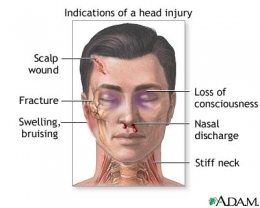By Miriam Raftery
 December 3, 2010 (San Diego’s East County) – The tragic death of Santee resident Bryson Lukacik points up the importance of knowing the danger signs following a head injury--and when to get treatment.
December 3, 2010 (San Diego’s East County) – The tragic death of Santee resident Bryson Lukacik points up the importance of knowing the danger signs following a head injury--and when to get treatment.
Lukacik suffered a head injury while snowboarding but didn’t tell family members at first. He became disoriented and had a lump on his head before disappearing from a cabin in Big Bear where he and his family were vacationing. His body was found in the snow this morning.
If you or someone you know suffers a head injury, here are guidelines on what to watch for—and when to seek medical help.
According to www.FamilyDoctor.org, you should get help if you notice the following symptoms:
• Any symptom that is getting worse, such as headaches, nausea or sleepiness
• Nausea that doesn't go away
• Changes in behavior, such as irritability or confusion
• Dilated pupils (pupils that are bigger than normal) or pupils of different sizes
• Trouble walking or speaking
• Drainage of bloody or clear fluids from ears or nose
• Vomiting
• Seizures
• Weakness or numbness in the arms or legs
Symptoms of a head injury may occur immediately, or develop slowly over hours or days. Even if the head has no swelling, bruising or skull fracture, the brain can bang against the inside of the skull and be bruised, leading to bleeding or swelling internally.
For a mild head injury, no treatment may be needed. However, closely watch the person for any concerning symptoms over the next 24 hours. The symptoms of a serious head injury can be delayed. While the person is sleeping, wake him or her every 2 to 3 hours and ask simple questions to check alertness, such as "What is your name?"
Over-the-counter pain medicine, such as acetaminophen, may be used for a mild headache. Do NOT take aspirin, ibuprofen, or other anti-inflammatory medications because they can increase the risk of bleeding. Do not drink alcohol within 24 hours of suffering a head injury.
According to the National Institute of Health’s Medline.com, the following are steps that can be taken after a moderate to severe head injury:
1. Call 911.
2. Check the person's airway, breathing, and circulation. If necessary, begin rescue breathing and CPR.
3. If the person's breathing and heart rate are normal but the person is unconscious, treat as if there is a spinal injury. Stabilize the head and neck by placing your hands on both sides of the person's head, keeping the head in line with the spine and preventing movement. Wait for medical help.
4. Stop any bleeding by firmly pressing a clean cloth on the wound. If the injury is serious, be careful not to move the person's head. If blood soaks through the cloth, do NOT remove it. Place another cloth over the first one.
5. If you suspect a skull fracture, do NOT apply direct pressure to the bleeding site, and do NOT remove any debris from the wound. Cover the wound with sterile gauze dressing.
6. If the person is vomiting, roll the head, neck, and body as one unit to prevent choking. This still protects the spine, which you must always assume is injured in the case of a head injury. (Children often vomit once after a head injury. This may not be a problem, but call a doctor for further guidance.)
7. Apply ice packs to swollen areas.
Whether medical treatment could have saved Bryan Lukacik is unknown, of course. Nor is it clear how long it may have taken to get emergency care in the remote location.
But knowing the signs of a serious head injury and seeking prompt treatment can prevent brain damage or death in many cases. Finally, if you suffer a head injury, it's important to inform others immediately, since delays can have tragic consequences.
For more information on head injuries, see http://www.nlm.nih.gov/medlineplus/ency/article/000028.htm








Recent comments